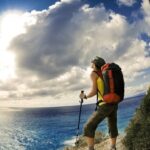Introduction
Solo travel can be an enriching experience, but it can also bring with it the worry of dealing with illness along the way. In this article, we'll cover some important tips and information on how to deal with illness while traveling alone.
When we're away from home and facing an unfamiliar environment, it's essential to be prepared for potential health problems. After all, our well-being is fundamental to make the most of the experience of traveling alone. Therefore, knowing some strategies to prevent and deal with diseases can be extremely useful.
One of the most important preventative measures is maintaining good personal hygiene. Wash your hands regularly with soap and water, or use alcohol-based hand sanitizer when you don't have access to a sink. This simple practice can help prevent infections and diseases transmitted through direct contact.
Additionally, it's important to stay hydrated throughout your trip. Always carry a bottle of water with you and make sure to drink regularly, especially in hot weather. Proper hydration helps strengthen your immune system and prevents health problems related to dehydration.

Another important point is to be up to date with the recommended vaccines for destination of your tripBefore traveling, consult a doctor or vaccination center to see if any specific vaccinations are required for the destination you're visiting. Some regions of the world have a higher risk of diseases like malaria, yellow fever, or dengue, and protection against these illnesses is essential.
In addition to these basic measures, it's always a good idea to have travel insurance that covers medical and hospital expenses. This way, if you need medical care while traveling, you'll be financially protected and can receive the necessary care without worry.
Preparation before the trip
Before setting off on your solo trip, it's essential to take some precautions to avoid health problems. Be sure to consult a doctor to ensure you're in good health. health to travel. Also, make sure your vaccinations are up to date and that you have enough medications for the duration of your trip.
Consult a doctor: Before embarking on a solo trip, it's highly recommended that you visit a doctor for a general health assessment. This is especially important if you have any pre-existing medical conditions or are taking regular medications. Your doctor will be able to provide specific guidance based on your current health and medical history, and may also recommend additional preventative measures to ensure a safe and healthy trip.
Update your vaccinations: Make sure your vaccinations are up to date before traveling, especially if you're traveling to a destination with specific disease risks. Certain diseases may be more common in certain regions, and it's important to protect yourself against them. Consult a doctor or a health center specializing in travel medicine to ensure you have all the necessary vaccinations.
Medications and care: Make sure you carry the necessary medications for the duration of your trip. Make sure you have enough medication to cover the entire trip and carry extra in case of any unforeseen circumstances. It's also recommended to have a copy of your prescriptions and a list of the medications you're taking with you to facilitate any emergency medical care during your trip.
Nutrition and Hydration
A healthy diet and adequate hydration are essential to maintaining your health while traveling. traveling aloneIt's important to take good care of your body and provide it with the nutrients it needs to stay energized and disease-resistant. Here are some tips for maintaining proper nutrition and hydration during your journey.
Fresh, well-cooked food
Try to consume fresh, well-cooked food, avoiding foods of dubious origin. When choosing places to eat, opt for restaurants and establishments that follow good hygiene practices and have a reliable reputation. Ensure that food is properly cooked, especially meat, poultry, fish, and eggs, to avoid ingesting bacteria and parasites that can cause intestinal infections.
Additionally, include fruits and vegetables in your diet to get vitamins, minerals, and fiber that strengthen your immune system. These foods also help maintain good bowel function, preventing gastrointestinal discomfort during travel. Remember to wash fruits and vegetables thoroughly before eating.
Drink bottled or filtered water
Proper hydration is essential for proper body function, especially while traveling. Drink bottled or filtered water to avoid ingesting contaminated water. In some destinations, water quality can be questionable and may contain disease-causing microorganisms. Therefore, avoid drinking tap water or water from unknown sources.
In addition to water, you can also consume natural juices, teas, and coconut water to stay hydrated. Avoid sugary drinks and soda, which can cause stomach discomfort. Remember to carry a reusable water bottle to stay hydrated throughout the day.
Avoid excessive alcohol consumption
While it may be tempting to try alcoholic beverages typical of a destination, avoid excessive alcohol consumption, as it can compromise your immune system. Excessive alcohol consumption can affect your body's ability to fight infections, making you more susceptible to illness. Furthermore, excessive alcohol consumption can lead to dehydration, which can worsen the effects of traveling in hot weather or with high physical activity.
If you decide to consume alcoholic beverages, do so in moderation and alternate with water to stay hydrated. Know your limits and respect your surroundings, avoiding behaviors that could put your safety at risk.
Ensure a healthy diet and adequate hydration during your solo travel is essential to make the most of your journey. Remember to take care of your body, as it is your best travel companion.
First aid
Always carry a first aid kit in your luggage while traveling. It's essential to be prepared for minor health issues that may arise while you're away from home. A basic first aid kit should contain items such as bandages, pain relievers, antiseptics, and medications for headaches and nausea. These items are readily available at pharmacies and are essential for treating minor injuries or relieving mild symptoms.
If you have any specific medical conditions, such as allergies, it's important to carry the necessary medications with you. Make sure you have enough for the duration of your trip and keep them accessible at all times. Also, inform others about your medical condition, such as family members or close friends. This way, if an emergency occurs, they will know what to do and can provide important information to healthcare professionals if necessary.
Having basic first aid knowledge can also be extremely useful during solo travel. Courses and training are available that teach cardiopulmonary resuscitation (CPR), choking first aid, and other emergency situations. These skills can make the difference in a life-or-death situation, especially when immediate help is not available.
In addition to the essentials in your first aid kit, consider including other useful items depending on the type of trip you're taking. For example, if you're hiking in the wilderness, it's recommended to bring insect repellent and bite relief ointment. If you're traveling to areas with a high risk of mosquito-borne diseases, such as malaria, it's important to bring protective nets and mosquito-specific repellent.

It's always important to remember that a first aid kit is not a substitute for consulting a healthcare professional. If you experience more severe or persistent symptoms, it's crucial to seek medical help immediately. However, having an adequate first aid kit can help resolve minor health issues and provide a little extra peace of mind during your solo trip.
Insect and animal care
In some regions, insects and animals can pose a health risk. It's important to be prepared to deal with these situations during your stay. solitary journeysUse insect repellent to protect yourself from bites and be aware of possible signs of animal-borne diseases, such as rabies or malaria.
To avoid insect bites, especially in tropical regions or regions with high mosquito incidence, the use of repellents is recommended. Look for products containing ingredients such as DEET, IR3535, or icaridin, as they are effective at repelling mosquitoes, ticks, and other insects. Apply the repellent according to the manufacturer's instructions and reapply it regularly, especially after swimming or sweating.
Be alert for possible signs of animal-borne diseases during your travels. Rabies, for example, is a viral disease transmitted primarily through the bite of infected animals, such as dogs, cats, or bats. If you are bitten by an unknown animal, immediately wash the wound with soap and water and seek medical attention as soon as possible. The rabies vaccine is effective in preventing the disease when administered properly.
Avoid direct contact with unfamiliar animals and exercise caution when exploring wild areas. Some animals can carry diseases, such as malaria, which is transmitted by the bite of an infected Anopheles mosquito. When traveling to malaria-endemic areas, it's important to take preventative measures, such as wearing long-sleeved clothing, long pants, and insect repellent containing specific substances to repel malaria-carrying mosquitoes.
Medical assistance at destination
Before traveling, it's crucial to learn about the availability of medical care at your destination. Research and identify hospitals, clinics, and pharmacies near your accommodation. Having this information handy can be extremely useful in case of an emergency or need for medical care during your trip.
Additionally, it's highly recommended that you take out travel insurance that covers medical expenses. This will provide security and peace of mind in the event of any unforeseen health-related incidents. Make sure the travel insurance you choose offers adequate coverage for your needs, including emergency medical assistance, medical evacuation, and repatriation.
In case of an emergency, be prepared to contact local emergency services. In many countries, the emergency medical number is 112, but it's important to check the correct number for your destination. Keep these numbers handy, either written down on paper or saved on your phone.

Travel insurance and medical assistance
Travel insurance is essential for any solo traveler. Besides covering medical expenses, it can also provide legal assistance, reimbursement for trip cancellations, lost luggage, and other common travel mishaps. Carefully review the insurance coverage and terms before purchasing.
Documentation and medical history
It's recommended to carry a copy of your medical history, including information about allergies, pre-existing conditions, and medications you take regularly. This can be helpful if you need medical care abroad and need to provide this information to healthcare professionals.
Pharmacies and medicines
It's not always easy to find specific medications in another country, especially if you're taking prescription or long-term medications. Therefore, check whether it's permitted to bring your medications to your destination and whether there are any restrictions or special requirements. Also, make a list of the generic names of the medications you take to facilitate communication if necessary.
Final considerations
Dealing with illness while traveling solo can be challenging, but with the right precautions, you can minimize the risks. It's essential to always be aware of your health and follow medical advice to enjoy your trip. travel with peace of mind and safety.
To ensure a healthy trip, it's important to take some preventative measures. Before you leave, consult a doctor to check if you're fit to travel and if you have any other health issues. vaccination required for your chosen destination. Stay up to date with recommended vaccinations, especially those considered mandatory for certain countries or regions. Also, bring a first aid kit containing essential items, such as medication for headaches, nausea, fever, and bandages.
A healthy diet is essential to keep your immune system strong while traveling. Try to eat fresh, well-cooked food and avoid excessive consumption of street food or food of dubious origin. Drink bottled water and avoid ice in places with questionable water quality. Remember to wash your hands frequently, especially before meals and after using the bathroom, using soap and water or alcohol-based hand sanitizer.
Additionally, it is important to get adequate rest and avoid excessive stress. Lonely journeys can be exciting, but they can also be exhausting. Make sure you set aside time to rest, relax, and recharge. Adequate sleep and stress reduction can help maintain a healthy immune system.
Remember to respect your limits and don't hesitate to seek medical assistance if necessary. Even if you take all precautions, unforeseen events can happen. Be prepared to contact local emergency services if you need medical assistance during your trip. Check in advance the availability of medical assistance at your destination, identifying hospitals, clinics, and pharmacies near where you'll be staying. Also, take travel insurance with you that covers medical expenses, ensuring greater peace of mind in case of emergencies.
Remember, traveling alone can be an experience incredible and enriching. With proper care, you can make the most of your journey, discovering new places, cultures, and people. Stay informed, be prepared, and enjoy your trip safely and healthily.
Lucas Wanderlust has a tireless spirit of adventure, always seeking new travel experiences. Fascinated by the world and the possibility of exploring unknown destinations, he fell in love with the sense of freedom and self-discovery that traveling alone provides. With a backpack on his back and a heart open to the unknown, Lucas embarks on exciting journeys, where each destination becomes a unique chapter in his life story. He gives himself body and soul to the magic of solo travel, inspiring others to follow in his footsteps and discover themselves through adventure.







